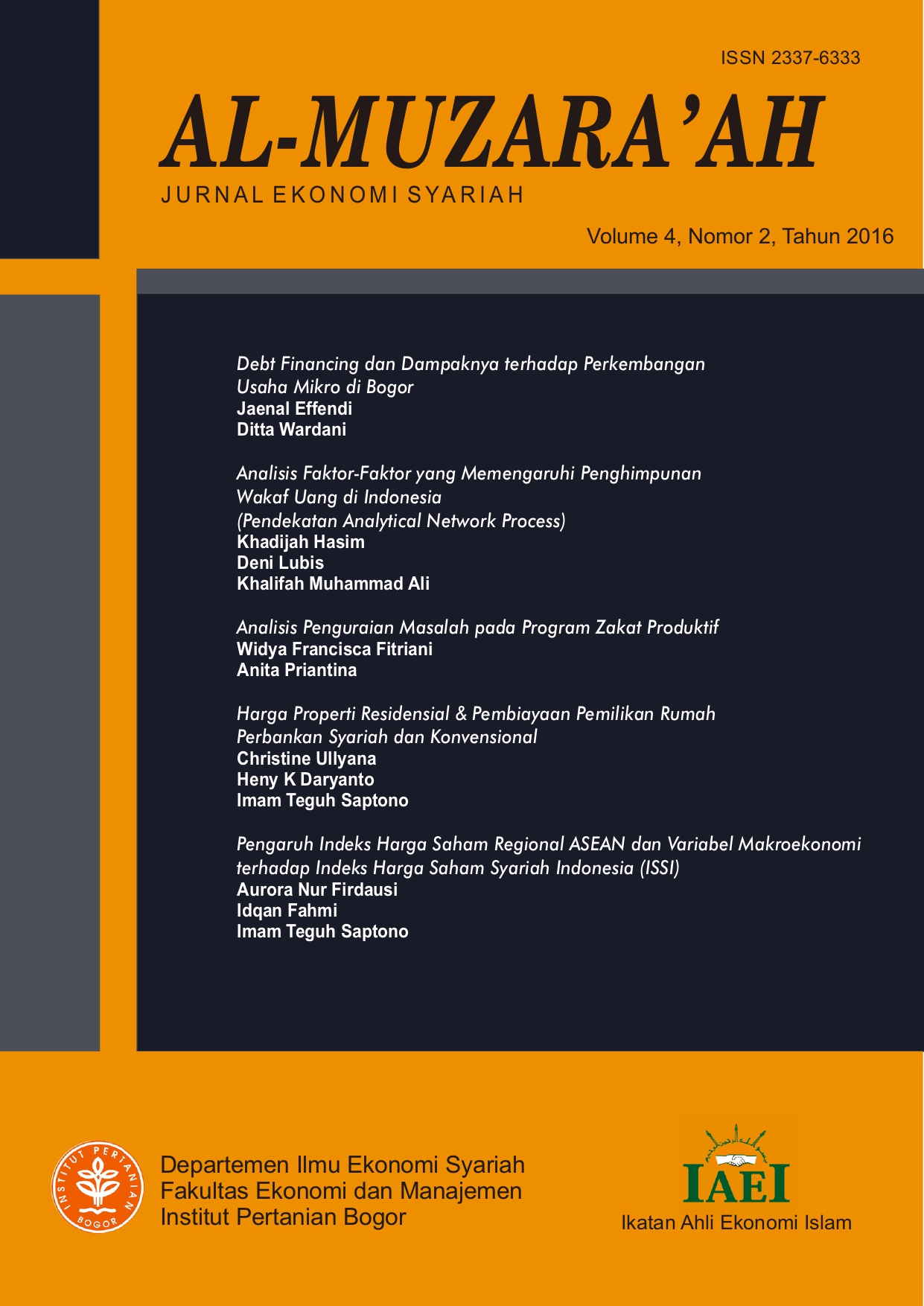Analisis Faktor-Faktor yang Memengaruhi Penghimpunan Wakaf Uang di Indonesia (Pendekatan Analytical Network Process)
Main Article Content
Abstract
Indonesia is a country with the largest Muslim population in the world. The potential of Islamic financial instruments grows among the society, and one of them is cash waqf. Cash waqf already have a complete law and legal institutions, but there is a gap between the potency and the real data of cash waqf raising. The aim of this research is to analyze the condition of cash waqf raising and the factors affecting the level of cash waqf raising in Indonesia. Using Analytical Network Process (ANP), the factors that affect the level of cash waqf raising are divided into three aspects namely institutional, society, and government. The results show that the institutional aspect has the biggest impact affecting the level of cash waqf raising and the three most influential factors are the focus of nazhir institutions, the understanding of society about cash waqf, and completeness of the cash waqf law.
Article Details
Section
Author(s) who published in this journal agree to following terms:
- Authors understand and agree that copyright of manuscripts published are held by Al-Muzara'ah. The statement to release the copyright to Al-Muzara'ah is stated in Copyright Transfer Agreement (CTA) form.
- Copyright encompass exclusive rights to reproduce, to distribute, and to sell any part of the journal articles in all form and media.
This work is licensed under a Creative Commons Attribution-ShareAlike 4.0 International License (CC BY-SA) where Authors and Readers can copy and redistribute the material in any medium or format, as well as remix, transform, and build upon the material for any purpose, but they must give appropriate credit (cite to the article or content), provide a link to the license, and indicate if changes were made. If you remix, transform, or build upon the material, you must distribute your contributions under the same license as the original.
References
Ascarya. Analytic Network Process (ANP) Pendekatan Baru Studi Kualitatif. Jakarta (ID): Seminar Internasional Program Magister Akuntansi Fakultas Ekonomi; 2005 Januari 27 (2005)
Ascarya. The development of Islamic financial system in Indonesia and the way forward. Occasional Papers No. OP/10/02, 2010 (2011)
Ascarya, Yumanita, Diana. Determinan dan Persistensi Margin Perbankan Konvensional dan Syariah di Indonesia. Working paper. No.WP/10/04. Pusat Pendidikan dan Studi Kebanksentralan Bank Indonesia (2010)
[BPS] Badan Pusat Statistik. Data Penduduk Menurut Wilayah dan Agama yang Dianut. [internet]. [diunduh pada 2016 September 27]. Tersedia pada http://sp2010.bps.go.id/index.php/site/tabel?tid=321&wid=0 (2010)
[BWI] Badan Wakaf Indonesia. Data Tanah Wakaf Seluruh Indonesia Maret 2016. [Internet]. [diunduh pada 2016 September 26]. Tersedia pada http://bwi.or.id/index.php/in/tentang-wakaf/data-wakaf/data-wakaf-tanah.html (2016)
Effendy MI. Faktor-faktor yang memengaruhi persepsi nasabah terhadap program wakaf tunai di dompet dhu’afa [tesis]. Depok (ID): UI (2007)
Efrizon A. Faktor-faktor yang memengaruhi pemahaman masyarakat tentang wakaf uang [tesis]. Depok (ID): UI (2008)
Karim SA. Contemporary waqf administration and development in Singapore. The Singapore International Waqf Conference, Singapore, pp. 2-10 (2007)
Kettani H. 2010 World Muslim Population. Proceedings of the 8th Hawaii International Conference on Arts and Humanities; 2010 Jan; Honolulu, Hawaii (US) (2010)
Khalil IA. Ali Y. Shaiban M. Waqf fund management in Kuwait and Egypt: Can Malaysia learns from their experiences. Proceeding of the International Conference on Masjid, Zakat and Waqf (IMAF 2014) 1-2 December 2014, Kuala Lumpur, MALAYSIA (2014)
Mannan MA. Cash waqf, enrichment of family heritage generation to generation. Social Investment Bank Publication Series No. 1. (1998)
Mohsin, MIA. Financing trough cash-waqf a revitalization to finance different needs. International Journal of Islamic and Middle Eastern Finance and Management. 6(4): 3-10 (2013)
[MUI] Fatwa DSN MUI No. 29 Tahun 2002 Tentang Wakaf Uang
Nasution ME & Hasanah U. Wakaf Tunai Inovasi Finansial Islam, Peluang dan dalam Mewujudkan Kesejahteraan Umat. Jakarta: PKTTI-UI (2005)
[PP] Peraturan Pemerintah Republik Indonesia Nomor 42 Tahun 2006 Tentang PelaksanaanUndang-Undang Republik Indonesia Nomor 41 Tahun 2004
Prihatna. Praktik Wakaf untuk Keadilan Sosial. Jakarta (ID) : CSRC UIN (2006)
Rusydiana AS & Devi A. Analysis of cash waqf fund management in Indonesia: an Analytic Network Process (ANP) method approach. International Conference on Islamic Finance (AICIF), Yogyakarta (2014)
Saaty TL, Vargas LG. Decision Making with the Analytic Network Process: Economic, Political, Social and Technological Applications with Benefits, Opportunities, Costs and Risks. Pittsburgh (US): Springer (2006)
Saaty TL. Theory and Applications of the Analytic Network Process. Pittsburgh (US): RWS Publications (2005)
[UU] Undang-Undang Republik Indonesia Nomor 41 Tahun 2004 Tentang Wakaf

